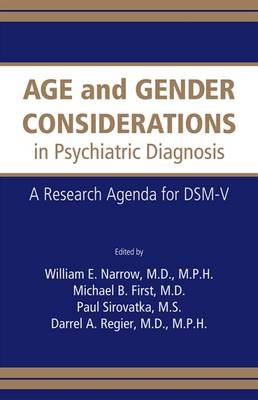
Age and Gender Considerations in Psychiatric Diagnosis
American Psychiatric Association Publishing (Verlag)
978-0-89042-295-3 (ISBN)
Written to help identify major gaps in our knowledge of how gender and age affect psychiatric diagnoses and to stimulate much-needed research to fill these gaps, Age and Gender Considerations in Psychiatric Diagnosis serves as both a valuable short-term source for the DSM-V Task Force and its disorder-specific workgroups, and a long-term guide for future studies that will contribute to revised psychiatric classifications in these three areas.
Here, 47 experts present findings in three areas of psychiatric research that historically have been neglected but rightfully have received increasing attention in recent years and thus are worthy of investigation into their clinical features, etiology, and course:
1. Significant gender differences in prevalence, symptom profiles, and risk factors for mental disorders, including neurodevelopmental, neurophysiological, and environmental factors for men and women that cut across diagnostic categories-for example, the critical importance of gender in how psychiatric illness develops and presents; DSM's approach to gender to date; and relevant research findings and gaps in the epidemiology, etiology, and pathophysiology of disorders and the gender-related expression of psychopathology, including the controversial and complex question of whether DSM should have different diagnostic criteria for men and women.
2. Mental disorders in infancy and early childhood, including diagnosis and measurement of psychopathology; PTSD and social and cognitive factors related to the experience of stress; reactive attachment disorder (unique in part because of its specificity to early childhood); mood and anxiety disorders and difficulties in diagnosis; sleep disorders, including two new disorders, Night-Waking Dysomnia and Sleep-Onset Dysomnia; feeding disorders, including the need to address overeating and overfeeding (especially given the alleged U.S. epidemic of obesity); early childhood manifestations of behavior disorders; and early symptoms and diagnosis of autism.
3. Mental disorders in the elderly, such as dementia and depression, once considered normal consequences of aging but now understood to represent mental disorders, including the need to identify specific brain structure abnormalities, biomarkers, and the many contributing biological, psychosocial, and environmental factors of mental illness in late life and to understand their roles in the elderly to better diagnose and monitor disease progression.
Written for clinicians and researchers alike, this thought-provoking compendium contributes critical information that helps enhance our understanding of the causes of mental disorders, develop effective preventive and treatment interventions, and inform future editions of DSM and ICD.
William E. Narrow, M.D., M.P.H., is Deputy Director of the American Psychiatric Institute for Research and Education and the Division of Research of the American Psychiatric Association in Arlington, Virginia. Michael B. First, M.D., is Research Psychiatrist at New York State Psychiatric Institute and Associate Professor of Clinical Psychiatry at Columbia University College of Physicians & Surgeons in New York, New York. Darrel A. Regier, M.D., M.P.H., is Executive Director of the American Psychiatric Institute for Research and Education and Director of the Division of Research at the American Psychiatric Association in Arlington, Virginia. Paul J. Sirovatka, M.S., is Associate Director for Research Policy Analysis, Division of Research/American Psychiatric Institute for Research and Education, Arlington, Virginia.
CONTRIBUTORS
PREFACE
ACKNOWLEDGMENTS
PART I: Sex/Gender
Chapter 1. INTRODUCTION
Chapter 2. WHY GENDER MATTERS
Chapter 3. DSM'S APPROACH TO GENDER: History and Controversies
Chapter 4. GENDER AND THE PREVALENCE OF PSYCHIATRIC DISORDERS
Chapter 5. NEUROBIOLOGY AND SEX/GENDER
Chapter 6. SOCIOCULTURAL FACTORS AND GENDER
Chapter 7. A DEVELOPMENTAL PERSPECTIVE, WITH A FOCUS ON CHILDHOOD TRAUMA
Chapter 8. THE LONGITUDINAL LABORATORY OF WOMEN'S REPRODUCTIVE HEALTH
Chapter 9. CLINICAL VALIDATORS OF DIAGNOSES: Symptom Expression, Course, and Treatment
Chapter 10. GENDER AND DIAGNOSTIC CRITERIA
Chapter 11. CONCLUDING THOUGHTS
PART II: Early Childhood
Chapter 12. DIAGNOSIS OF PSYCHOPATHOLOGY IN INFANTS, TODDLERS, AND PRESCHOOL CHILDREN
Chapter 13. A RESEARCH AGENDA FOR POSTTRAUMATIC STRESS DISORDER IN INFANTS, TODDLERS, AND PRESCHOOL CHILDREN
Chapter 14. REACTIVE ATTACHMENT DISORDER
Chapter 15. MEASUREMENT OF PSYCHOPATHOLOGY IN CHILDREN UNDER THE AGE OF SIX
Chapter 16. NOSOLOGY OF MOOD DISORDERS IN PRESCHOOL CHILDREN: State of Knowledge and Future Directions
Chapter 17. DIAGNOSIS OF ANXIETY DISORDERS IN INFANTS, TODDLERS, AND PRESCHOOL CHILDREN
Chapter 18. CLASSIFYING SLEEP DISORDERS IN INFANTS AND TODDLERS
Chapter 19. CLASSIFYING FEEDING DISORDERS OF INFANCY AND EARLY CHILDHOOD
Chapter 20. DISRUPTIVE BEHAVIOR DISORDERS AND ADHD IN PRESCHOOL CHILDREN: Characterizing Heterotypic Continuities for a Developmentally Informed Nosology for DSM-V
Chapter 21. DIAGNOSIS OF AUTISM AND RELATED DISORDERS IN INFANTS AND VERY YOUNG CHILDREN: Setting a Research Agenda for DSM-V
PART III: The Elderly
Chapter 22. AGING-RELATED DIAGNOSTIC VARIATIONS: Need for Diagnostic Criteria Appropriate for Elderly Psychiatric Patients
Chapter 23. LATE-LIFE DEPRESSION: A Model for Medical Classification
Chapter 24. CHALLENGES OF DIAGNOSING PSYCHIATRIC DISORDERS IN MEDICALLY ILL PATIENTS
Chapter 25. USE OF BIOMARKERS IN THE ELDERLY: Current and Future Challenges
Chapter 26. IMPACT OF PSYCHOSOCIAL FACTORS ON LATE-LIFE DEPRESSION
INDEX
| Erscheint lt. Verlag | 8.10.2007 |
|---|---|
| Zusatzinfo | 20 Tables, unspecified; 6 Line drawings, black and white |
| Verlagsort | VA |
| Sprache | englisch |
| Maße | 152 x 229 mm |
| Gewicht | 553 g |
| Themenwelt | Medizin / Pharmazie ► Medizinische Fachgebiete ► Psychiatrie / Psychotherapie |
| Studium ► 2. Studienabschnitt (Klinik) ► Anamnese / Körperliche Untersuchung | |
| ISBN-10 | 0-89042-295-8 / 0890422958 |
| ISBN-13 | 978-0-89042-295-3 / 9780890422953 |
| Zustand | Neuware |
| Haben Sie eine Frage zum Produkt? |
aus dem Bereich


